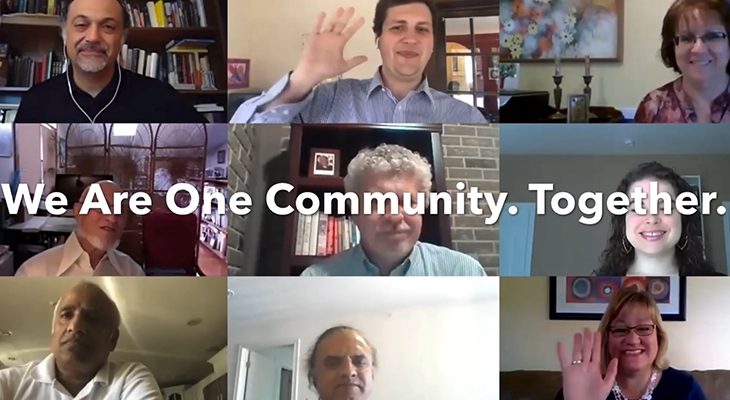Does Interfaith Work Stop During a Pandemic?
September 16, 2020

I wonder what I would have told my younger self about the work of interfaith community organizing when our spinning world seemed to just stop on a dime in mid-March. As a young minister and the Executive Director of Columbus Interfaith, I remember worrying about the many relational and organizational setbacks that may be inevitable results of our abrupt physical isolation.
Share
Related Articles
American Civic Life
Higher Education
American Civic Life
And yet if I could speak to that younger me from six months ago, I would reassure him that the spirit and promise of interfaith cooperation and justice work are more resilient and adaptable than I could ever imagine.
And yet if I could speak to that younger me from six months ago, I would reassure him that the spirit and promise of interfaith cooperation and justice work are more resilient and adaptable than I could ever imagine.
Even as a relatively new organizational body of member congregations in our area, Columbus Interfaith had made great strides over the past 18 months to foster an ethic of care and mutuality among its Guiding Team that, little did we know, would be essential in the face of COVID-19. Ironically, while sheltering in place, we accepted the invitation, the impulse, the call, to reach out to one another, to grow closer, and to stay on the journey despite the challenges and uncertainties ahead.
We continued to gather online and deepen our sense of collective identity and mission in our region of Indiana. While some programs and plans had to be set aside because of the pandemic, we quickly asked a guiding question that we return to often, “how can we support one another?” Or another question, “how can we respond to one another’s needs and be relevant and impactful in each other’s lives?” One outcome was our shared recognition that beneath the fear and anxiety our community faced, there existed a tremendous amount of grief and pain that had to be honored and named through our collective show of interfaith solidarity. And so, we gathered our five religious communities—Hindu, Muslim, Jewish, Christian, and Unitarian Universalist—along with several other congregations not yet a part of our fledgling interfaith group, and we designed a virtual interfaith vigil to honor those who have died from the virus and those who serve as first responders in this incredible public health crisis.
During the COVID-19 Interfaith Vigil, which was pre-recorded on Zoom and premiered on YouTube, there were religious leaders who spoke, prayed, chanted, and called for healing and justice. The cross-section of our diverse small city of Columbus was on full display, as we aimed to offer support and hope during a time of tremendous difficulty in our world. During my remarks, I spoke to the power of saying yes to interfaith cooperation:
“As an interfaith community, we have said yes, yes to sticking together in this time, yes to not going it alone. We have said yes to the need to remember and to offer hope in this difficult time. The coronavirus hasn’t impacted just one of our religious communities or just one religion; no, it has upended all of our lives, all of our religious communities. And because of this and because we are all taught to love our neighbor, we are here today, together in spirit, committed to grieving and moving forward as one community.”
I believe this was a turning point not only for the couple hundred people who attended this vigil virtually but also for our collective interfaith community. Even in the face of death, we chose to say yes to life and to stick together. In the months that followed, we have built upon this momentum and care for one another by officially expanding our membership to include a few more congregations in the area, not surprisingly those who participated in the interfaith vigil. We also look forward to more ways that we can connect now, instead of waiting and waiting and waiting for the right time to be together safely in person. Now is the time to be together, whether body or in spirit.
So does interfaith work come to a halt in the face of a pandemic. No, in fact, as we shelter in place, as we recall the blessing of shelter in and of itself, we are reminded that we are all in this together. Through this memory the promise of our journey takes flight.
Rev. Nic Cable serves as the minister of the Unitarian Universalist Congregation of Columbus, IN. He graduated summa cum laude from both DePaul University (2011) and Chicago Theological Seminary (2014). Nic has received a fellowship from the Interfaith Youth Core (2010, 2018) and the Forum for Theological Exploration (2012). He married his best friend and they raise their 20-month-old daughter with the help of their two well-meaning dogs and two not-so-well-meaning cats.



